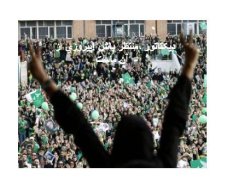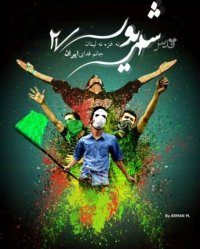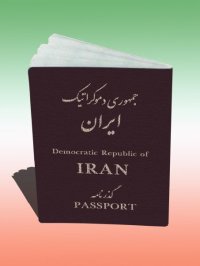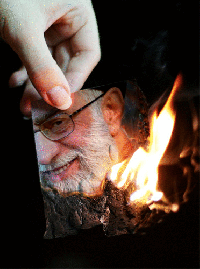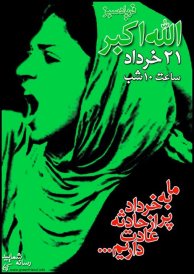 The Haghani Circle ( many believe secretly “Hojjatieh” ) led by Ayatollah Mesbah Yazdi , along with Mojtaba Khamenei and the leadership of the Iranian Revolutionary Guards (IRGC) are believed to be responsible for the stolen election. The connection between the Haghani’s and the IRGC may simply be a marriage of convenience as where Yazdi’s group are purely motivated by religious beliefs, the IRGC may be primarily motivated by power and economics. Although, the IRGC is a favorite destination for many Haghani students. Mojtaba, along with his 4 brothers, are all clerics and students of Yazdi. It is clear that Yazdi controls the ideology of the ultra-conservatives who are currently in control of the Government and Mojtaba has great influence over the militias. Yazdi’s influence has mushroomed over the last decade, and with the election of Ahmadenijad in 2005 his disciples have infected the government at all levels. He is the spiritual leader of many of the key players in the turmoil unfolding in Iran today, including Mahmoud Ahmedinejad. Also, most Haghani students serve either in the security forces or the mobilization forces ( Basij) . Among their many beliefs, is that the Mahdi (12th Imam) is soon to be revealed to the world and that they have a responsibility to prepare for this great event. This includes removing the republic element from The Islamic Republic of Iran and creating a true “Islamic State.” They do not believe elections are necessary and they are opposed to the Khomeinist doctrine of Veleyat-e faqih. Yazdi has recently stated
The Haghani Circle ( many believe secretly “Hojjatieh” ) led by Ayatollah Mesbah Yazdi , along with Mojtaba Khamenei and the leadership of the Iranian Revolutionary Guards (IRGC) are believed to be responsible for the stolen election. The connection between the Haghani’s and the IRGC may simply be a marriage of convenience as where Yazdi’s group are purely motivated by religious beliefs, the IRGC may be primarily motivated by power and economics. Although, the IRGC is a favorite destination for many Haghani students. Mojtaba, along with his 4 brothers, are all clerics and students of Yazdi. It is clear that Yazdi controls the ideology of the ultra-conservatives who are currently in control of the Government and Mojtaba has great influence over the militias. Yazdi’s influence has mushroomed over the last decade, and with the election of Ahmadenijad in 2005 his disciples have infected the government at all levels. He is the spiritual leader of many of the key players in the turmoil unfolding in Iran today, including Mahmoud Ahmedinejad. Also, most Haghani students serve either in the security forces or the mobilization forces ( Basij) . Among their many beliefs, is that the Mahdi (12th Imam) is soon to be revealed to the world and that they have a responsibility to prepare for this great event. This includes removing the republic element from The Islamic Republic of Iran and creating a true “Islamic State.” They do not believe elections are necessary and they are opposed to the Khomeinist doctrine of Veleyat-e faqih. Yazdi has recently stated “The authority of Khamenei comes from God, not from the people.”
“The authority of Khamenei comes from God, not from the people.”
DROI
Some known Members
Many famous theologians and influential figures in Iran’s politics after the revolution were associated (as teacher or student) with the Haghani Circle or follows its ideology:
Ali Fallahian,The Former Ministry of Intelligence and National Security
Ahmad Jannati , The Chairman of the Guardian Council
Ali Younesi, The Former Ministry of Intelligence and National Security
Rouhollah Hosseinian
Gholam Hossein Mohseni-Ejehei, Iran’s Prosecutor General and Former Ministry of Intelligence and National Security
Mostafa Pourmohammadi., Former Interior Minister
Mostafa ebrahimifar
Hojjat ol eslam Raieesi
Hojjat ol eslam Alizadeh
Gholam Reza Naghdi
General Zolghadr
General Allah Karam
Hossein Shariatmadari , Managing Editor of Kayhan newspaper
Abbas Salimi Namin , Head of the Office of Research Studies for Compiling Contemporary Iranian History
Hasan Shaianfar
Mojtaba Zolnour – Supreme Leader Khamenei’s representative to the Revolutionary Guards
Hojjat ol eslam Izad-Panah
Hojjat ol eslam Meravi
Hojjat ol eslam Rahbar
Mohammad Rei-shahri, The Ministry of Intelligence and National Security
Hojjat ol eslam Neeiazi
Hojjat ol eslam Nezam-Zadeh
Hojjat ol eslam Mohammadi-Eraghi
Hojjat ol eslam Moalla
Sadeq Ziarati
Mohsen Mohammadi Eraqi
Hojjat ol eslam Mir-Sepah
Hojjat ol eslam Faker
Ahmad Khatami , Member of the Assembly of Experts and Substitute Friday Prayer Leader
Ayatollah Seyyed Hasan taheri Khorramabadi
Ayatollah Javadi Amoli
Ayatollah Dr. Ahmad Ahmadi
Ayatollah Mohammad Taghi Mesbah Yazdi, the founder of Haghani School, is President Mahmoud Ahmadinejad’s ideological mentor and spiritual guide.
November 9, 2009
Rajanews announced the names of Ayatollah Mesbah-Yazdi’s students, confidants and political companions. The list includes the following names:
Hojjatoleslam Gholam-Reza Fayazi (philosophy teacher)
Hojjatoleslam Seyyed Mahmoud Nabavian (Islamic thought expert)
Hojjatoleslam Mahmoud Rajabi
Hojjatoleslam Morteza Aqa-Tehrani (Mysticism expert and a graduate of a Canadian school; long-term former resident of Canada and the United States)
Seyyed Mohammad-Reza Tabatabayi (director of the Jameat al-Zahra women’s seminary)
Dr. Abbas-Ali Shameli (assistant professor at the Imam Khomeini Institute)
Dr. Seyyed Ahmad Rahnamayi (information deputy at the Imam Khomeini Institute)
Dr. Mohammad Fanayi-Eshkevari (assistant professor at the Imam Khomeini Institute)
Dr. Shomali (assistant professor at the Imam Khomeini Institute)
Dr. Mohammad-Javad Zarean (head of the Imam Khomeini Institute publications)
Akbar Mir-Sepah (professor of Quranic sciences)
Seyyed Mohammad Qaravi (head of the psychology faculty of the Imam Khomeini Institute)
Mohammad-Hossein Bahjati-Ardakani (Friday Prayers Leader of Ardakan)
Ali Mobasheri (head of the Islamic Revolution Courts of Tehran)
Parviz Davoudi (former first vice president and head of the Imam Khomeini Institute’s economics faculty)
Manouchehr Mohammadi (deputy foreign minister- head of the Imam Khomeini Institute’s faculty of political sciences)
Abbas-Ali Kadkhodayi (Guardian Council Spokesman and head of the Imam Khomeini Institute’s faculty of law)
Gholam-Hossein Elham (former government spokesman and Guardian Council member)
Ebrahim Fayaz, Hossein kachouyan, Mousa Najafi , Qasem Ravanbakhsh, Mohammad-Naser Saqayi-Biriya, Ali-Reza Panahian, Mohammad Fanayi-Nematsara, Mahmoud Namazi, Hossein Jalali, Mohammad-Hossein Borjian, Mahmoud Dehqani, Mojtaba and Ali Mesbah-Yazdi, Ahmad Jahan-Bozorgi, Abdolmajid Eshkevari, Abolhassan Haqqani, Ali Masouminia, Hamid Kasiri, Abdoljavad Ebrahimi, Mohammad-Mehdi Naderi, Ahmad and Ali Abutorabi, Hamid Rasayi and Ahmad Rahdar.
________________________________________________
********Ahmadinejad and the Mahdi*********
 Here is an in depth look at Mahdism and Hojjatieh, as well as their influence on Ahmadinejad’s Government and how they are putting their beliefs into action. This article was written in the fall of 2008.
Here is an in depth look at Mahdism and Hojjatieh, as well as their influence on Ahmadinejad’s Government and how they are putting their beliefs into action. This article was written in the fall of 2008.
Read Article…Middleeastforum
_______________________________________________________
******Hojjatiyeh, Mesbahiyeh, and Ahmadinejad******
 Here is a well researched and detailed history on the birth of the Hojjatieh to its present day activities and power in the Iranian establishment.
Here is a well researched and detailed history on the birth of the Hojjatieh to its present day activities and power in the Iranian establishment.
Read aritcle….Tehran Bureau
_______________________________________________________
More information on Mojtaba Khamenei
For an in-depth look at Mojtaba’s background, influence’s, and connections read
The man in the shadow: Mojtaba Khamenei
_________________________________________________
———–Islamic Iran Watch————
Here, we will try to keep track of changes in and pursuit of Government policy that is geared toward the Haghani Circle (Hojjatieh) belief in turning Iran into a pure Islamic state in preparation for the eventual return of the Mahdi.
1. Iranian seminaries take over public schools
November 25, 2009 – Management of Iranian public schools is being transferred to the seminaries. Etemad daily cites Ali Zolelm, head of Council of Cooperation between Ministry of Education and the seminaries saying that in several provinces and the city of Qom, seminaries have taken over the management of schools.
Last month the Ministry of Education reported that they have also adopted a plan to permanently assign a member of the clergy to each school in order to “fulfill the cultural needs” of students.
The plan to transfer the management of schools to the seminaries was approved in March 2009 by the Ministry of Education and seminary representatives. According to this plan, 4200 elementary, middle and high schools will be transferred to the care of the seminaries for five years. The Ministry will remain in charge of “providing the learning environment in the form of the school buildings,” whilst the seminaries will “provide the principals, administrators and the cultural and religious content.”
The plan also indicates that the professional staff will be provided by the Ministry of Education, while the expenses of the schools will be the responsibility of the seminaries. Source: RadioZameneh
2. Government presses to segregate the sexes in schools
* Not official policy yet, but aggressively pursuing
November 29, 2009 – While the Iranian government has been focusing on segregating university students on sexual lines since Ahmadinejad’s reelection, Iran’s minister of Science Kamran Daneshjoo stated on Friday, “We shall segregate students on sexual lines as the Islamic worldview requires.”
These remarks about segregating students at the country’s universities come after the remarks that former Majlis speaker Haddad Adel, a supporter of Ahmadinejad and a close associate of ayatollah Khamenei, made when Daneshjoo came to office when he said, “Islamization of universities is a long awaited task for the new minister of science and we hope to accomplish soon with the help of theology centers around the country and the supreme council of the cultural revolution.”
Sexual Segregation Ahmadinejad Style
Since Ahmadinejad came to office, the discussion of sexual segregation has been on the agenda of many theology centers and at the national level. The creation of single-sex hospitals, constructing single-sex parks, separating offices for men and women, separating entrances to buildings for men and women at universities, elimination of men teachers in all-girls schools, are examples of many such acts implemented by this administration.
The first act in this sphere was when the minister of culture and Islamic guidance Mohammad Hossein Saffar Herandi issued a circular to his deputies circular in the summer of 2005 to implement this segregation goal and banned the presence of women in after-working hours in the ministry offices. This was soon extended to other ministries including the Social Services Organization.
In 2006, the ministry of education initiated a program to eliminate men from women high-schools which was not fully implemented because of the shortage of teachers, but experts have said that the goal is still on the table.
Following this trend, since 2006 the ministry of science and health sciences began implementing a plan to segregate the entrance gates to universities for men and women students which continued with the segregation of some classrooms. Limiting the number of quotas for women in the national university entrance exams is another government program measure in this light. Source: Roozonline Author: Bahram Rafiee
Update: January 7, 2010
Gender segregation in universities on the agenda
3. Iran bans make-up for women on Television
December, 2 2009 – Women appearing in television programs will not be allowed to wear make-up because it is against Islamic law, or sharia, media on Wednesday quoted the head of Iran’s state television as saying.
“Make-up by women during television programs is illegal and against Islamic sharia law … There should not be a single case of a woman wearing make-up during a program,” Ezatollah Zarghami was quoted as saying by the reformist Etemad newspaper.
Zarghami, a former member of the elite Revolutionary Guards who has been re-appointed by supreme leader Ayatollah Ali Khamenei, also ordered that women guests should “preferably” be hosted by women.
Speaking at a conference of network directors, he also called for cutting down on music during programs and urged his staff to take a cue from Western action movies, which have “excellent and calm music.”
“I do not mean that we should become like them, but we should use positive points. Therefore we (should) put on the agenda the reduction and refining of music,” he said.
“As of today, you in the production department should launch new supervisory methods … I do not want to tell you to filter, but you should be vigilant that nothing inappropriate happens,” Zarghami said.
Zarghami told directors they should also prohibit “repulsive jokes” between men and women on television or radio, Etemad and Fars news agency quoted him as saying.
When he reappointed Zarghami to a second term last month, Khamenei reportedly told him it was essential to make an “outstanding representation of morality, religion, hopefulness and awareness” in state media programs.
The Islamic republic’s state television has eight TV channels and 15 radio stations.
It has seen different periods of strict or relaxed dress and make-up codes.
Women on television do not expose their hair, but have been indulging in heavy make-up in recent years.
Television is under close scrutiny and observes strict guidelines to an extent that even some local movies have been censored before being aired. Source: Al Arabiya
4. December 29, 2009
State Television issues some new rules, chief among them is ” No mention of women’s first names. ”
Full story @ ayandenews (farsi)
| The Apocalypse, Messianism Define Ahmadinejad’s Policies | |
|---|---|
| Mahmud Ahmadinejad: ”A divine hand will come soon to root out the tyranny in the world.” |
In an extraordinary series of comments, the Supreme Leader’s official representative in the Revolutionary Guards Corps has made the headlines again by claiming that neither the people nor the Assembly of Experts are able to oust the Leader from power as he has been “chosen by God” for this position.
Addressing the audience in the holy city of Qom, Zolnour told those present that “the legitimacy of the Valiy-e-Faghih comes from above,” and that it was he who gave legitimacy to the system. He also went on to suggest that it was impossible for the people or the Assembly of Experts whose function according to the constitution is to oversee the Leader’s performance to remove him from power.
“The people prepare the groundwork for the implementation of Guardianship of the Jurist and they do so by voting for the clerics of the Assembly of Experts. The members of the Assembly of Experts do not appoint the Leader, but they discover him and it is not so that they can oust him from power whenever they wish to do so.”
Amazingly Zolnour also added that the Leader “was not confined by the constitution,” and went as far as saying that even the late Imam Khomeini the founder of the Islamic Revolution went beyond the boundaries of the constitution at times. “It is wrong to say that the Valiy-e-Faghih is constrained by the law.”
Zolnour who has a history of making controversial statements, also stressed on the importance of the Guardians Council in safeguarding the Islamic Republic while arguing that “true democracy” existed in the election of the Assembly of Experts.
Ever since the fraudulent Presidential Election in June and Ayatollah Ali Khamenei’s hasty approval of the announced vote, many have started to question his legitimacy and his ability to fulfil his role as the Leader of the country.
* Mojtaba Zolnour is a member of the Haghani Circle (see list above)
These video clips show Ahmadinejad speaking with Mesbah Yazdi and other ultra conservative clerics about creation of Islamic Regime (no mention of Republic). He also speaks about the youth, and that they have never felt “a clean breath” from their parents, and therefore cannot expect to think straight. This meeting reportedly took place in Qom on June 13, 2009, one day after the theft of the Presidential election in Iran.
Parliamentarians blame Hojjatieh for Iran’s election debacle
Obedience to Ahmadinejad is Like Obedience to God
 While many of the prominent clerics and senior ayatollahs in the country refrained from congratulating Ahmadinejad even after ayatollah Khamenei confirmed Ahmadinejad’s presidency, ayatollah Mesbah Yazdi announced that, “When the leader consented to the Ahmadinejad’s presidency, obedience to him was the same as obedience to God.”
While many of the prominent clerics and senior ayatollahs in the country refrained from congratulating Ahmadinejad even after ayatollah Khamenei confirmed Ahmadinejad’s presidency, ayatollah Mesbah Yazdi announced that, “When the leader consented to the Ahmadinejad’s presidency, obedience to him was the same as obedience to God.”
This ultra-conservative cleric added, “When the leader appoints and confirms the president, the latter is transformed and light then shines on him.” This member of the Experts Assembly interpreted the public uproar over the results of the presidential election of June 12 to be aimed at the elimination of the leader and said, “The events that took place recently were aimed at the velayat faghih (i.e. religious leader) and whoever was behind the events, the goal was to eliminate velayat faghih from the political system of the country.”
Believing that an order by velayat faghih is divine and that people have no role in electing any one, Mesbah Yazdi also said, “When the leader approves a law, it becomes a religious duty on people, similar to daily prayers and fasting.”
It should be noted that prior to the June 12 presidential elections, a number of staff from the ministry of interior published a letter in which they had talked about Mesbah Yazdi’s ‘fatwa’ (i.e. religious decree) in support of cheating in the elections. According to the letter, Mesbah mentioned this fatwa at a private meeting in the presence of senior directors of the ministry of interior and justified it as a protective measure for Ahmadinejad’s administration which according to him has succeeded in fulfilling the goals of Islam in Iran and other countries.
Rooz online
——————————————————————————–
Spokesman says Iran’s supreme leader represents Mahdi
Muslims must unite for Islam’s savior: Iran
August 18, 2009 DUBAI (Saud al-Zahed)
The spokesman of Iran’s Supreme Leader called on neighboring countries to mobilize their forces in preparation for the coming of the savior of Islam and to unite with the Islamic Republic in paving the way for his arrival, an Iranian news agency reported Sunday.
to unite with the Islamic Republic in paving the way for his arrival, an Iranian news agency reported Sunday.
Ayatollah Ali Khamenei’s spokesman, Ali Saeedi, said countries like Turkey, Iraq, Lebanon, Pakistan and Afghanistan should gather together all their forces in order to make drastic changes to prepare for the coming of al-Mahdi al-Montazar, Arabic for “the awaited guided one.”
” Since the armed forces are commanded by the Supreme Leader, they are thus obeying the orders of the Awaited Mahdi ”
Ali Saeedi, Iran rep.”We still have a long way to go in order to achieve this. We have to train honest forces that can stop the obstacles that may hinder the coming of the Mahdi like the United States and Israel,” Saeedi said in statement posted by the Iranian Labor News Agency (ILNA).
Saeedi also said that the supreme leader of Iran is the direct representative of the Mahdi and that obeying him is like obeying the “guided one,” who is the prophesized savior of Islam.
Ali Saeedi
“Since the armed forces are commanded by the Supreme Leader, they are thus obeying the orders of the awaited Mahdi,” Saeedi said, adding “the Revolutionary Guards and the armed forces in Iran hold religious authority to prepare for the appearance of the Mahdi.”
The Mahdi is believed by Muslims to be arriving before Judgment Day to rid the world of injustice. Although present in both major Islamic schools of thought, the Mahdi is more prominent in the Shiite doctrine than the Sunni one.
Wednesday, 07 May 2008
Stop ‘Mahdi’ talk, Iran scholars tell Ahmadinejad
TEHRAN (AFP)
 Iranian scholars have told President Mahmoud Ahmadinejad to stick to more worldly issues after he said the “hidden imam” of Shiite Islam was directing the country’s affairs.
Iranian scholars have told President Mahmoud Ahmadinejad to stick to more worldly issues after he said the “hidden imam” of Shiite Islam was directing the country’s affairs.
Ahmadinejad has always been a devotee of the Mahdi, the twelfth imam of Shiite Islam, who Shiites believe disappeared more than a thousand years ago and who will return one day to usher in a new era of peace and harmony.
But in a speech to theology students broadcast by state television on Monday, Ahmadinejad went further than ever before in emphasizing his belief that the Mahdi is playing a critical role in Iran’s day-to-day politics.
“The Imam Mahdi is in charge of the world and we see his hand directing all the affairs of the country,” he said in the speech, which appears to date from last month but has only now been broadcast.
“We must solve Iran’s internal problems as quickly as possible. Time is lacking. A movement has started for us to occupy ourselves with our global responsibilities, which are arriving with great speed.”
Scholarly Reaction
Two leading scholars retorted that Ahmadinejad would be better off concentrating on Iran’s social problems — most notably its double-digit inflation — than indulging in such mystical rhetoric.
“If Ahmadinejad wants to say that the hidden imam is supporting the decisions of the government, it is not true,” said Gholam Reza Mesbahi Moghadam, the spokesman of the pro-reform Association of Combatant Clerics.
“For sure, the hidden imam does not approve of inflation of 20 percent, the high cost of living and numerous other errors,” he said, according to the Kargozaran daily.
Ali Asghari, a member of the conservative Hezbollah faction in parliament, told the president not to link the management of the country to the imam.
“Ahmadinejad would do better to worry about social problems like inflation … and other terrestrial affairs,” the Etemad Melli daily quoted him as saying.
Hidden Imam
Since becoming president in 2005, Ahmadinejad has repeatedly stated that his government is paving the way for the return of the Mahdi and chided his foes for not believing that his return is imminent.
Shiites believe that the Mahdi vanished in the 10th century and will return at an apocalyptic moment that will mark the end of time.
Ahmadinejad’s focus on that has previously caused controversy, while other governments have usually place their emphasis on other figures such as the Imam Ali, the cousin of Prophet Muhammed (PBUH) and first imam of Shiite Islam.
Earlier this year, Iran’s former top nuclear negotiator Hassan Rowhani complained that superstition was growing in the country and that people were even putting out food for the Mahdi in case he returned that very night.
Ahmadinejad also raised eyebrows when he said he felt surrounded by a mystical aura when he gave his first speech to the UN General Assembly in New York in 2005.
Similarly, in his latest speech, Ahmadinejad said the Mahdi had guided his “victory” in his famous talk to jeering students at Columbia University in New York last year where he was greeted as a “a petty and cruel dictator”.
“I recalled the imam and I said to him ‘help so that this scene is to the benefit of Islam’,” he said.
Al Arabiya
Mousavi Aid, Ali Akbar Mohtashamipour Warned Of The Dangers Of The Mesbah Yazdi Clan One Year Ago.
 Letter here in Farsi
Letter here in Farsi
Although the de-structuralization done by the Ahmadinejad – Mashaee couple and their surrounding friends has afflicted the country with turbulence in both domestic and foreign policy, undoubtedly it is an effective step towards the desired model by Mesbahieh organization [unofficial organization related to Mohammad Taghi Mesbah Yazdi, a member of the Assembly of Experts and a very powerful religious and political figure in the Iranian politics, known to be strongly against the reformist movement and one of the masterminds of the fraud in recent presidential elections]. The reason is that for any fundamental change the need to destruct the current structure is felt. In this regard one should not forget that Ahmadinejad’s government is a transition government and not a government in the ideal situation from the point of view of Ayatollah Mesbah Yazdi. Hence the performance of such a government for the most part is tactical and not ideological. However the final and desired model by Mesbah Yazdi may be described as a “religious aristocracy” which is not after exporting revolutionary ideas but is seeking domestic stability and setting the stage for the appearance [of the 12th Shi’ite Imam, who is believed to be currently absent and only to appear when the ground is appropriate], far from any international adventure.
Mesbah Yazdi and The Ahmadinejad-Mashaee Phenomenon
The distinct ideas of Mesbah Yazdi are the links which suggest him as the theorist of Ahmadinejad’s government. When Ahmadinejad questioned the previous decades of the Islamic Revolution in the presidential campaign debates, his act was theoretically supported by the desired model that in his opinion and also in the opinion of his like-minded, specifically Ayatollah Mesbah Yazdi, the Islamic Republic should move towards [that desired model] from the current situation. Mesbah Yazdi in not seeking stability of the regime in the current situation but he is looking for its upheaval towards his own desired way and Ahmadinejad’s mission can be evaluated based on this approach: de-structuralization.
Ayatollah Mesbah Yazdi is also opinionated about the foreign policy and the presence of a person like Esfandyar Rahim Mashaee and his intimacy with Mahmoud Ahmadinejad is also incidentally understandable from the same point of view. Although Mesbah Yazdi pretends to be an anti-foreigner in the public forums [tribunes that the religious figures use to talk to people] but all of his top students are graduates of the west and he also has a very distinct opinion regarding international transactions compared to other Howzeh [the school of religion in Qom, Iran whose teachers are among the most prominent religious and political figures in the country] teachers. “The notion of appearance of a super human who is a global element exists in other religions as well. If we eliminate some of the characteristics that we believe in, the notion of Mahdaviat [the appearance of the 12 Shi’ite Imam] will be extended and will not remain limited to Asna Ashari Shi’ite faith [a denomination of Shi’ism that believes in 12 successors of Mohammad as Imams, with the last one being absent and due to appear] but it will be expanded to all the religions.” (From the closing speech of Ayatollah Mesbah Yazdi in The Second Conference on Mahdaviat Doctorine, August 2006)
Therefore the increasingly close relationship between Ahmadinejad and Mashaee despite their sheer difference in position is understandable. If we consider Ahmadinejad to represent the anti-foreigner face of Mesbah Yazdi in public forums, Rahim Mashaee can be considered as his other face that promotes the globalization of Shi’ism as a step towards the appearance and governance of the absent Imam even with the price of deviating from some principles. “I believe that for the appearance [of the 12th Imam] it is not necessary that all the people on the face of earth become Muslims. We have reached the conclusion that to prepare the world for the appearance we cannot use religious vocabulary because it does not create a common language. We need to resort to a common human language and therefore we need to use a widely understood vocabulary such as justice, battling tyranny, kindness and worshiping only one God.” (Esfandyar Rahim Mashaee)
Here’s a transcript of what he is saying. Basically he is approving of Bush’s armageddonist supporters and scorns some Iranians for not believing in the important matter that “hidden Imam” is managing the world now, and is going to emerge from a chaos in the region.
Some see the appearance of the enemy [USA] and not their conscience, or don’t pay attention. These who have come invaded Iraq, in appearance it seems that they have come for oil, robbing the region. That is right, but when you go one layer deeper you see that they have analyses, they come with the awareness that there is going to be an event in this region, that a sacred godly hand will come out to uproot tyranny from the world. They say these things amongst themselves, they have so much attention to these matters. But here, some think that during “absence” Imam (The hidden, Imam Mahdi) has gone to a corner busy with his own life, and doesn’t care about world affairs. If Imam didn’t care, the world would have turned upside down, universe will have ended. Imam manages the world!










